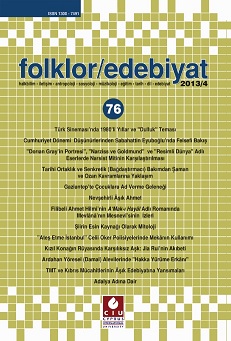Türk Sinemasinda 1980’li Yillar Ve “Dulluk” Temasi Etrafinda Üretilen Geleneksel Cinsiyet Rolleri
Turkish Cinema in 1980s’ and Gender Roles Around the Theme of Widowhood
Author(s): Hülya DoğanSubject(s): Gender Studies, Cultural history, Social history, Culture and social structure , Film / Cinema / Cinematography
Published by: Uluslararası Kıbrıs Üniversitesi
Keywords: Widowhood; Woman; Turkish Cinema;
Summary/Abstract: A process which is named as “initiation” by anthropologists describes a progression from a state or position to another. In a lot of culture, rituels accompanies to these processes like progression from childhood to adulthood, from bachelorhood to marriage, from life to death. Keeping this process in peace is important for cultures also because of the threatening nature of it. These steps are making difficulties for classification and so they are difficult to control. “Widowhood” is one of those statuses which is really problematic especially in patriarchal societies. Neither single nor married women mean “uncontrolled woman sexuality”. For patriarchal societies, this is a big problem when a family or a husband is not controlling it, especially if this woman is awake about her sexuality. In Anatolia, being “widow” means a really problematic status for a woman. In widowhood process, it is expected to be in mourning from woman till she marries with a man in a parallel status. This article examines two films (Kurbağalar and Dul Bir Kadın), as tools which nourish each other with culture. These films are made in 1980s’ that is called “woman cinema” in Turkish film history. In these years women get character instead of being “good” or “bad” woman. Although this new wave, secondary status of woman and patriarchal control of them can be observed in these films. Directors (Şerif Gören and Atıf Yılmaz) who leads this wave don’t seem to go beyond this masculine border.
Journal: Folklor/Edebiyat
- Issue Year: 19/2013
- Issue No: 76
- Page Range: 9-20
- Page Count: 12
- Language: Turkish

